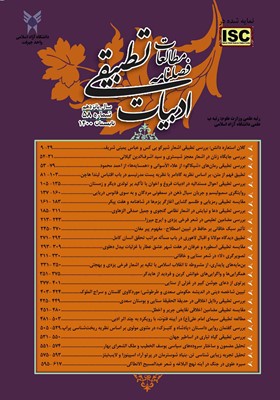تطبیق دیدگاه مولانا و اقبال لاهوری در باب مسأله مراتب تحقق انسان کامل
محورهای موضوعی : شعر
محمد بندانی ترشکی
1
![]() ,
فرج الله براتی
2
*
,
گودرز شاطری
3
,
فرج الله براتی
2
*
,
گودرز شاطری
3
1 -
2 - استادیار ،گروه فلسفه و کلام اسلامی، واحد اهواز،دانشگاه آزاد اسلامی ، اهواز،ایران
نویسنده مسئول:فرج ا...براتی
3 - استادیار ،گروه فلسفه و کلام اسلامی، واحد اهواز ،دانشگاه آزاد اسلامی،اهواز ، ایران
کلید واژه:
چکیده مقاله :
بین اشعار مولوی و اقبال لاهوری شباهتهای وجود دارد که موجب شده این دو شاعر بزرگ به هم نزدیک شوند. سؤال اصلی در این نوشتار این است که انسان از دیدگاه مولانا و اقبال لاهوری دارای چه جایگاهی هستند؟ بررسی اشعار این دو شاعر و مقایسه آنها در رابطه با انسان و محتوای آن بیانگر این است که مولانا و اقبال لاهوری اعتقاد دارند که در سلسله مراتب وجود، انسان به عنوان آخرین مرتبه هستی پا به عرصه عالم گذاشته و یا به قولی متأخّر زمانی است، ولی علت اصلی و غایی آفرینش محسوب میگردد و خلاصه و اشرف تمام مخلوقات به شمار میرود. از مشترکات دیدگاه مولانا و اقبال لاهوری میبایست به نوع نگاه آنها به انسان به عنوان موجودی دو بعدی و دارای مراتب، غایت خلقت بودن انسان کامل و برتری انسان بر سایر موجودات اشاره کرد. نتایج حاکی از آن است که اقبال لاهوری علاوه بر شباهت نگرش به مولانا به فلسفه تربیتی انسان توجه دارد.
There are similarities between the poems of Movlavi and Iqbal Lahori that caused these two great poets to be close to each other. The main question in this article is what is the position of human beings from the point of view of Movlavi and Iqbal Lahouri? Examining the poems of these two poets and comparing them in relation to man and its content shows that Movlavi and Iqbal Lahori believe that in the hierarchy of existence, man has entered the world as the last stage of existence, or in other words, it is late in time. But it is considered as the main and ultimate cause of creation and it is considered as the summary of all creatures. Among the commonalities of the views of Movlana and Iqbal Lahori, it is necessary to point out their view of man as a two-dimensional and hierarchical being, the end of the creation of the perfect man, and the superiority of man over other beings. The results indicate that Iqbal Lahouri, in addition to the similarity of his attitude towards Movlana, pays attention to human educational philosophy.
کتابنامه
قرآن کریم.
نهج البلاغه.
اقبال لاهوری، محمد. 1382ش، کلیاتاقباللاهوری، گردآوری اکبر بهداروند، تهران: انتشارات زوار.
بشردوست، مجتبی. 1381ش، سودای حقیقت(هستیشناسی مولانا)، چاپ اول، تهران: نشر روزگار.
مطهری، مرتضی. 1376ش، انسان کامل، تهران: انتشارات صدرا.
مولوی، جلال الدین. 1386ش، دیوانکبیر، به تصحیح توفیق سبحانی، تهران: انجمن آثار و مفاخر فرهنگی.
نسفی، عزیزالدین. 1390ش، الإنسانالکامل، مترجم: انجمن ایران شناسی قرانسه در تهران، چاپ یازدهم، تهران: انتشارات طهوری.
مقالات
فراقی، تحسین. 1386ش، «متأثرانازمولوی: تأثیرمولویبراندیشهمحمداقباللاهوری»، آینه میراث، ش 38، صص 331- 344.
_||_The Holy Quran.
Nahjolbalagheh.
Iqbal Lahori, Mohammad 2003, Generalities of Iqbal Lahori, compiled by Akbar Behdarvand, Tehran: Zavar Publications.
Bashardost, Mojtaba 2002, The Sorrow of Truth (Movlana's Ontology), First Edition, Tehran: Roozgar Publishing.
Motahari, Morteza 1997, The Perfect Man, Tehran: Sadra Publications.
Movlavi, Jalaluddin 2007, Divan-e Kabir, edited by Tawfiq Sobhani, Tehran: Association of Cultural Works and Honors.
Nasfi, Aziz al-Din 1390, Al-Ensan Al-Kamil, Translator: Iranian Society of Quranic Studies in Tehran, 11th edition, Tehran: Tahoori Publications.
Articles
Faraqi, Tahsin. 2007, "Influenced by Movlavi: The Influence of Movlavi on the Thought of Mohammad Iqbal Lahori", Mirror of Heritage, Vol. 38, pp. 331-344.

